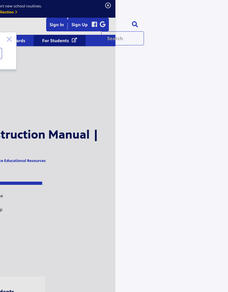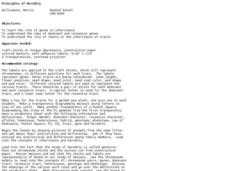Curated OER
genetics
Parts of the cell as well as genetic material begin this presentation. As the slides continue, there are explanations of the main terms used in genetics. The structure of genetic material, chromosomes, and replication are summarized....
PBS
DNA 101: Life's Instruction Manual | UNC-TV Science
Unravel the DNA molecule in just over a minute! Future geneticists listen and watch a video exploring DNA's structure, function, and the interaction of the genes and proteins that decode and interpret the complex molecule. Scholars...
Mr. E. Science
Our Solar System
The presentation starts with the scientists who made discoveries about our solar system: Ptolemy, Copernicus, Galileo, Brahe, Kepler, and Newton. It also covers the planets, inner, outer, and Pluto, satellites, and an in-depth discussion...
Curated OER
AP: Chapter 16: The Molecular Basis of Inheritance
Advanced biology masters take a close look at DNA and the scientists who contributed to our understanding of this complex and powerful molecule. They answer 21 questions about DNA structure, replication, and repair. This can be used as a...
Curated OER
AP: Chapter 14: Mendel and the Gene Idea
A survey of Mendelian genetics is presented through this handout. Biology prodigies answer questions about the Law of Segregation, phenotypic ratios, and dominance. They define genetics vocabulary terms and describe various genetic...
Curated OER
Meiosis
Students study meiosis and how it leads to variation. In this genetic reproduction lesson students complete a lab activity that calculates different genetic possibilities.
Biology Junction
Cell Cycle and Mitosis
Deepen understanding of cell division with this resource. Young scientists read short paragraphs about the different stages of the cell cycle and use this information to answer a series of basic short answer questions and label several...
Curated OER
Review of Cell Reproduction
In this biology review worksheet, students complete 50 multiple choice questions on the stages of mitosis and meiosis. They compare and contrast the two.
Biology Junction
Nucleic Acids
In this DNA instructional activity, students identify the different parts of the DNA and color them. They complete 16 short answer and fill in the blank questions on DNA.
Curated OER
Science Lessons for Grade 11
Students explore different activities in biology, physics and chemistry. In this science lesson, students examine chromosomes using a microscope and explain their significance in sustaining life on Earth. They investigate alkanes and...
Curated OER
Happy Face Spider Propagation
Students research genetic adaptations. In this chromosome lesson, students investigate dominant and recessive genes using spiders indigenous to Hawaii. Students create Punnett squares to determine the probability of passing specific...
Curated OER
Digital Mitosis and Claymation
Take mitosis and meiosis out of the biology textbook and onto the screen! An innovative class project prompts young biologists to create an animation movie using clay, showing the phases involved in mitosis or meiosis by moving the...
Curated OER
How Big is a Gene?
Learners model the size and structure of a bacterial chromosome. In this genetics lesson, students attempt to fit strands of thread into a gelatin capsule. They relate the activity to the coiling of DNA into chromosomes in a bacterium.
Curated OER
Inheritance Patterns in Zorks
In this inheritance patterns worksheet, students create a visual of a Zork using chromosome strips to represent alleles from the father and the mother to determine the traits in the offspring. Students translate the genotype to the...
Curated OER
Principles of Heredity
Students model traits on genes using colored paper and tongue depressors to represent chromosomes. In this heredity lesson plan, students use their "chromosome sticks" to understand chromosome pairs, genes, dominant traits, recessive...
Curated OER
How Does DNA Determine the Traits of an Organism?
For this DNA worksheet, students examine a sequence of DNA of a fictitious species. They determine the traits the species has given amino acids sequences and chart of traits that each amino acid sequence indicates. Students transcribe...
Curated OER
Meiosis
In this meiosis worksheet, high schoolers read about the phases of meiosis I and meiosis II and simulate the chromosomes and chromatids in each phase. Students draw the changes in each phase and produce 4 cells with half the DNA in the end.
Curated OER
Groovy DNA Beads
Learners create models of DNA and RNA using string and beads. They use beads representing the four nitrogenous bases of DNA to create a portion of a strand of DNA, and it's corresponding RNA. Then, students examine how many of their...
Curated OER
Mutations and Genetic Change
In this genetic mutations worksheet, students compare and contrast different types of mutations including point mutations, silent mutations, and frameshift mutations. This worksheet has 5 matching, 4 fill in the blank, and 3 short answer...
Curated OER
Genetics Intro
In this genetics worksheet, students write in definitions for 11 terms associated with basic genetics. Students use Punnett squares to complete 8 short answer questions.
Curated OER
When Heredity Follows Different Rules
In this heredity worksheet, students will use a Punnett square showing the mating of a human male and female to answer 4 questions. 2 short answer questions, 2 true or false statements.
Curated OER
Fertilization to Birth
In this fertilization instructional activity, middle schoolers complete 10 short answer questions about the phases of fertilization then place 6 events of fertilization in the appropriate order on a timeline.
Curated OER
An Inventory of My Traits
In this biology activity, students identify and describe a number of easily observable genetic traits and compare the traits they have with other students. Then they identify and describe that some traits are common while others are not...
Curated OER
Heredity
Learners are introduced to the basic principles of heredity. Through discussion and discrimination activities, they review the role of chromosomes and distinguish between those traits that can and cannot be inherited. Students use...

























